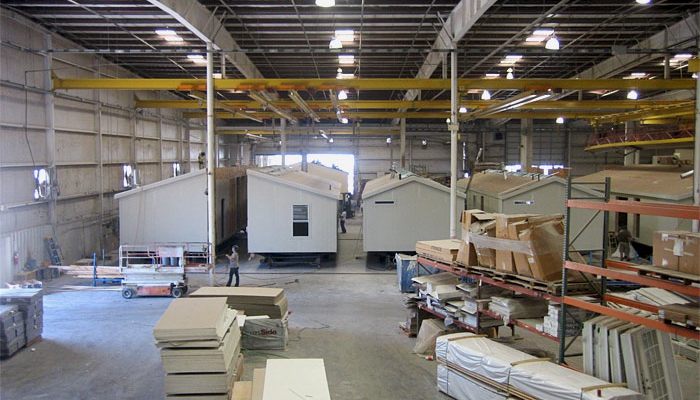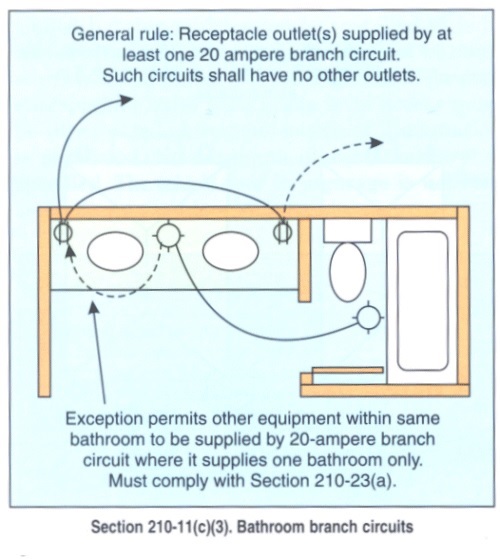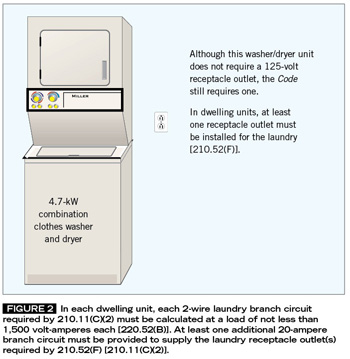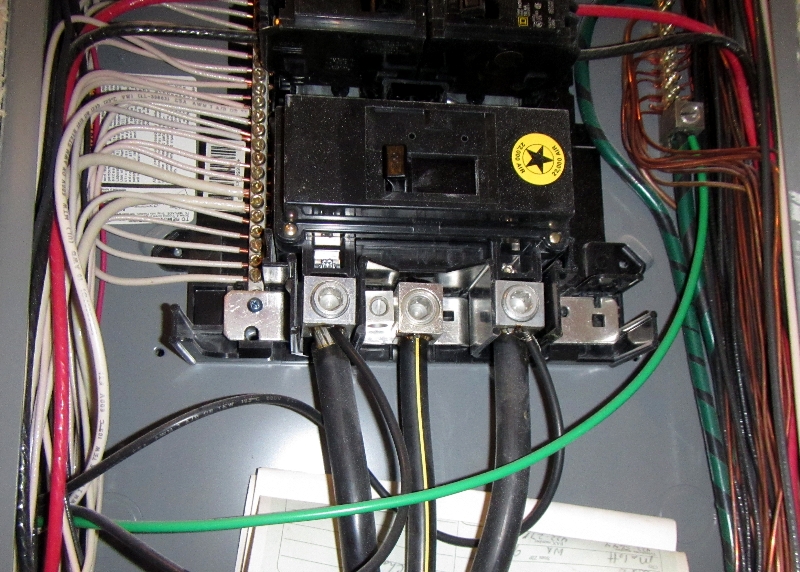You must be dedicated- Branch circuits for Kitchen, Baths and Laundry
It is very common during remodeling or when someone needs an extra receptacle or outlet to grab power from the nearest branch circuit, and depending on what branch circuit it is this may be a big no-no.
All too often during a home inspection (especially of homes that are a little older) I find that some that some circuits have been extended to the exterior or another location from one of these dedicated circuit areas.
I have two recent examples from home inspections. Example one is from a 1930’s home that the kitchen counter circuit was extended to the main bathroom. This is wrong in two ways that will be explained below.
![Kitchen Outlet requirements]()
The other example is very common- where an exterior receptacle was extended from the kitchen counter top circuit to an exterior receptacle (I have also seen this from bathroom and laundry circuits).
Remember when you do electrical work on a home you are most likely going to be required to meet current standards once you modify the original configuration. Only the local authorities can grant exceptions.
So what does this mean, well the main meaning is that who did this work was not an electrician most likely and the work was not permitted. That seems that is always a given. There is a reason for these dedicated circuits and people should be aware of these requirements.
So lets us look at the requirements which are defined in section 210.52 of the NEC (National Electrical Code). (Dwelling units is code speak for residential.) (Bold with underline is mine.)
210.52 Dwelling Unit Receptacle Outlets.
For the kitchen we are looking at what is called SABC (small-appliance branch circuits)
(B) Small Appliances.
(1) Receptacle Outlets Served. In the kitchen, pantry, breakfast room, dining room, or similar area of a dwelling unit, the two or more 20-ampere small-appliance branch circuits required by 210.11(C)(1) shall serve all wall and floor receptacle outlets covered by 210.52(A), all countertop outlets covered by 210.52(C), and receptacle outlets for refrigeration equipment.
(2) No Other Outlets. The two or more small-appliance branch circuits specified in 210.52(B)(1) shall have no other outlets.
Exception No. 1: A receptacle installed solely for the electrical supply to and support of an electric clock in any of the rooms specified in 210.52(B)(1).
Exception No. 2: Receptacles installed to provide power for supplemental equipment and lighting on gas-fired ranges, ovens, or counter-mounted cooking units.
(3) Kitchen Receptacle Requirements. Receptacles installed in a kitchen to serve countertop surfaces shall be supplied by not fewer than two small-appliance branch circuits, either or both of which shall also be permitted to supply receptacle outlets in the same kitchen and in other rooms specified in 210.52(B)(1). Additional small-appliance branch circuits shall be permitted to supply receptacle outlets in the kitchen and other rooms specified in 210.52(B)(1). No small-appliance branch circuit shall serve more than one kitchen.
This pretty well defines that unless the receptacle is located in the kitchen, pantry, breakfast room, dining room, or similar area you cannot extend that circuit to other areas (such as the exterior)r kitchens.
Now let’s look at the bathrooms and laundry per the NEC, same section 210.52 Dwelling Unit Receptacle Outlets.
![Bathroom receptacles Requirements]()
(D) Bathrooms. In dwelling units, at least one receptacle outlet shall be installed in bathrooms within 900 mm (3 ft) of the outside edge of each basin. The receptacle outlet shall be located on a wall or partition that is adjacent to the basin or basin countertop, located on the countertop, or installed on the side or face of the basin cabinet not more than 300 mm (12 in.) below the countertop. Receptacle outlet assemblies listed for the application shall be permitted to be installed in the countertop.
![Laundry Receptacle Requirements]()
(F) Laundry Areas. In dwelling units, at least one receptacle outlet shall be installed for the laundry.
Exception No. 1: In a dwelling unit that is an apartment or living area in a multifamily building where laundry facilities are provided on the premises and are available to all building occupants, a laundry receptacle shall not be required.
Exception No. 2: In other than one-family dwellings where laundry facilities are not to be installed or permitted, a laundry receptacle shall not be required.
But now we have to look at one more section of the NEC. (Bold with underline is mine.)
210.11 Branch Circuits Required.
C) Dwelling Units.
(1) Small-Appliance Branch Circuits. In addition to the number of branch circuits required by other parts of this section, two or more 20-ampere small-appliance branch circuits shall be provided for all receptacle outlets specified by 210.52(B).
(2) Laundry Branch Circuits. In addition to the number of branch circuits required by other parts of this section, at least one additional 20-ampere branch circuit shall be provided to supply the laundry receptacle outlet(s) required by 210.52(F). This circuit shall have no other outlets.
(3) Bathroom Branch Circuits. In addition to the number of branch circuits required by other parts of this section, at least one 20-ampere branch circuit shall be provided to supply bathroom receptacle outlet(s). Such circuits shall have no other outlets.
Exception: Where the 20-ampere circuit supplies a single bathroom, outlets for other equipment within the same bathroom shall be permitted to be supplied in accordance with 210.23(A)(1)and (A)(2).
Electrical systems should not be worked on unless you know what you are doing. I cannot stress this enough. In the State of Washington any electrical work has to have a permit if you modify the system.
“If you think it's expensive to hire a professional to do the job, wait until you hire an amateur.”
Red Adair
NCW Home Inspections, LLC is a Licensed Washington State Home Inspection service located in Wenatchee Washington serving Chelan County, Douglas County, Kittitas County, Okanogan County and Grant County Washington and the cities of Wenatchee, Leavenworth, Cashmere, Oroville, Cle Elum, East Wenatchee, Quincy and many more…
Your Wenatchee and Chelan Professional Real Estate, Home and Structural Pest Inspection Service
www.ncwhomeinspections.com 509-670-9572























































